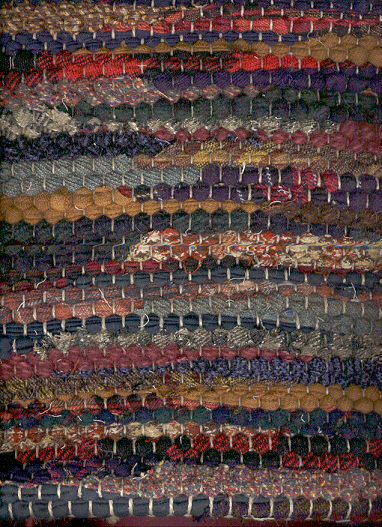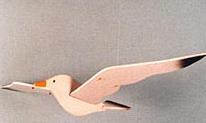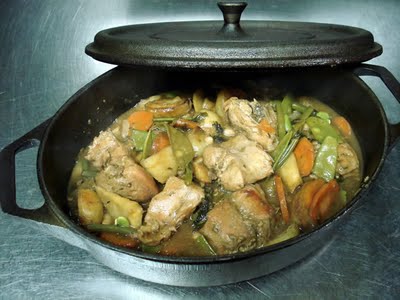This story appears in Rosanne Dingli's collection of stories:
The Astronomer's PigThe Day of the Bird
I was sick of that place. From the start there was nothing but mould, leaks and
draughts. I had exhausted my store of candles, and the lamp my landlady brought
to the attic was a spluttering thing whose smell was as vexing as the small
beetles that crossed the rag rug.
It was a thick rag rug which once, I suppose, sported a striped variety of colours to attest the passing of years and the motley fabrics that wove through the family. Now it was a sort of mid-brown, with a grey fringe. My own muddy boots added to its stained appearance, I am afraid.
But I had come there to write: to live in a street so long, it dizzied the walker into thinking it would never end. But it did, at a place that passed, then, for home. I climbed the narrow staircase from the street, which itself was a fascination. Not for being busy or picturesque, but for its geography. Because that street, you see, lay exactly along the border between two countries, whose choices presented themselves in a series of guises, since I left my mother’s hearth.
This was Putte, where one could see the change from Belgian to Dutch merely from looking at the faces of the women who came to the two bakeries in the two different countries along the street. They were – are still – faces so varied, so stoic, that I often regarded them as mere ovals when their blurred images passed. Eyes danced in the faces of the Flemish vrouwen, as if I saw them through a window channelled with rainwater, or full of tears. Chins jutted towards me on the faces of Dutchwomen, as if I had no business to be there. And perhaps I did not. Perhaps I had less right to be there, leaving damp footprints on Johanna de Platthy’s rag rug, than they, with their sturdy legs, pumping up and down on the pedals of black bicycles.
I was lonely then, and not because I was alone, since I never really had company before except for that of my mother, who would darn my mottled trousers while I crumbled the heel of one of her loaves of bread and cut paper thin slices out of her cheese. I was lonely because Johanna de Platthy said I was.
She looked at my clothes, my beard, my sodden boots, and tilted her head, not unkindly, while saying the words. She had just accepted me as a tenant. Goodness knows why. One of the reasons may be that she lived on the Belgian side of the street, and was one of the women with eyes that danced. I entered her home, sat on one of her unmatched chairs, gazed around at the looped curtains, the plants on her windowsill, the tiny cheap ornaments made crudely out of indifferent brass, and looked down at her rag rug to avoid those eyes. It was a clean rag rug, better than the one upstairs that she would lead me over later, but obviously one she made herself.
She seemed to have taken on the love the Dutch have for rag rugs. But what did I know? I had only visited Holland on two occasions before arriving in Putte. I did not know if the observation was either authentic or valid. I did not know the Dutch that well. And did not often now – unlike the way I did when younger and more arrogant – trust my powers of observation. Or the things I observed: the customs and artefacts, the behaviours and objects I saw. Or the way they translated themselves into fictions in my head. Then there was the lapse between head and hand, the frustrating slowness of the pen to keep up with the flow of words that seemed so perfect until a visible version of themselves appeared. What resulted on paper: was it a true, or even an adequate, way to describe the Dutch? What did I really know of them? Of Holland? Of women?
I had come there to write: articles, or even a book, as instructed by the man in Ghent, and now that the war was over I could sleep at last, and eat without haste, and arrive in new places without being viewed by townsfolk with fear and suspicion. Although I still looked like a fugitive, it was not from something over which I had no control, like the conflict between countries over borders that could be so confusing. I was a fugitive from grief, and not only the sorrow that accompanied the death of my mother. I grieved for things as they were, before the war sent me scuttling into the forest, over the long undulating plains; frightening birds, beasts and people alike.
Now that I had found a measure of peace, I could once more write, which was a relief. I wrote and scribbled to prove my poverty was self-inflicted. I sent my bundles of paper to the fat man in Ghent and he did the rest. Sometimes he sent back some cuttings with the money, and sometimes just a few lines to tell me what I should write about, and how long, and how soon. He said he had called me ‘Han Harben’ and it made me laugh, because I always avoid alliterations if I can help it. It would have made my mother laugh too, but for a different reason.
I did not care that Johanna de Platthy was completely bald. I asked myself whether I did – twice in the same fortnight – and really, I did not mind she had no hair at all. When I noticed, it was a swift and powerful shock, like the contraction in the stomach that strikes when one is discovered in a hiding-place by a soldier in a grey uniform. That happened to me twice, so I know. On both occasions I managed to get away, but not without difficulty.
And the feeling when I saw my landlady had no eyebrows, no eyelashes, and no hair under the headscarf she always wore was similar, but gave me no instinct to escape. I had to restart my sentence, of course, to disguise my discomfort, and managed to go on with what I was saying quite well.
I got used to her in a way. She was untidy and far from clean in her habits, but I ascribed that to her widowhood. She told me she was a widow, and I assumed her husband died in the war. I regarded the way she would sweep breadcrumbs off the table with the side of one hand into the cupped bowl of the other, vaguely, not minding that a large proportion of crumbs reached the rug. Her headscarf was always in place, indoors and out, and she would often raise a hand to pull it forward over her broad forehead. I thought it was a broad forehead, until my discovery that she had no hair at all, and that the broadness was baldness.
Sometimes, she would etch little marks with some sort of stick to signify eyebrows, before she went out to church. I noticed one Sunday when she called me down to eat. She had just returned after a long absence, which I calculated would be the length of a Mass and about an hour’s gossip on the forecourt of the small church. The downstairs room was as untidy as ever, with a months’ worth of newspapers piled near the window, the rucked rugs unshaken, the floor unswept and the curtains looped unevenly across dull glass.
‘Jabus!’ She used my real name, and not the one that appeared on pamphlets and journals under my writing. ‘Jabus, today I saw something unusual.’ And her eyebrows, which I saw were just traced on in black pencil, rose.
This was a rare thing. Johanna rarely initiated conversation in such an inviting way. I often had to drag words out of her in an effort to appear friendly and companionable myself. I could not find words to answer quickly enough for her.
‘Are you listening?’
‘I am listening.’ I replied in a jocular tone, because her enthusiasm was so evident. I dusted some crumbs from a chair and sat.
Johanna drew her skirts underneath her in a quick neat movement that belied her normal habits and sat on another of her wobbly chairs. ‘Today,’ she started, her eyes wide and dancing. ‘Today I saw a man on the plaats, with some wooden birds. Strange birds, made out of flat white pieces of wood. They hung from thin wires, like fishing line, and had hinged wings. He hung one on a pole and… listen to this, Jabus!’
‘I’m listening.’ I was amused and entertained by her animation.
‘A child came along and pulled a string – a string hanging from the belly of the bird – and its wings started to flap. It was flying! A wooden bird, hanging from a line, making flying sweeps with its wings, like flying!’
I looked at her, astonished at her naïve joy at the sight of a mere toy, and had no words to say. Was she baiting me? Was she really so simple as to enjoy such trifles? Her hand shot up and arranged her headscarf automatically, quickly, but her eyes were fixed on my face, needing a reaction.
‘How marvellous.’ I smiled not at the description, but at her joy.
‘And I was so tongue-tied I did not even ask him how much!’
‘How much?’
‘He was selling those wooden birds, Jabus!’
And she wanted one. Her eager face looked into mine and I was once more struck by the simple desire that lay there. Why had I never noticed before? The artificially advanced age that baldness had stamped on her appearance was all but gone, and she looked for all the world like a little girl who had seen a miracle. Johanna’s simplicity was complete, without artifice, and permanent.
‘And you want one.’
Her reaction to my words startled me and filled me with another inexplicable feeling. ‘Oh – Jabus! Yes.’ She stood and raised her arms, then quickly knelt on the rug and her arms circled me where I sat. I patted her absentmindedly on the back and looked around the room, understanding the reason now for the untidiness, the scattered way in which she did her housekeeping.
‘Next Sunday, Johanna,’ I said to my landlady. Then I thought of my funds and my scant ability to be generous. ‘Next Sunday, we shall see.’ My new realisation had me almost speechless again.
I wondered often after that about her husband and how he had coped. Whether he had been attracted to Johanna’s childishness or whether he had discovered it later, like I had. But a strange thing happened from the day of the bird. Johanna’s habits started to change. She took a frenetic interest in cleaning, and a determined interest in everything I had to say.
‘I am ashamed, Jabus,’ she said one day when I entered from the wet street and stamped on the rug inside. My hair dripped moisture onto my nose, my socks were saturated. I rid myself of my coat and shook my head like a dog. Suddenly, Johanna was by my side bearing a threadbare towel. ‘Here, run this over your head.’ Then she giggled. ‘I mean – rub your hair, Jabus. You must get dry. Come to the fire.’
I remembered her first words. ‘Why are you ashamed, Johanna?’ I half expected another story similar to her Sunday declaration.
But she came out with an unexpected spate of words in a kind of high pitched song, as if she had rehearsed it many times. ‘I’m sorry, Jabus, that I put you in that terrible attic. I have been very inhospitable and it is not worth the rent. I have moved your things to Peter’s room.’
‘Peter?’
‘My godfather – peter – he looked after me since my own father died of pneumonia. You know, he could hardly breathe!’
I took Johanna by the forearms and led her to one of the armchairs now neatly arranged on either side of the large window. ‘Listen, Johanna, why don’t you tell me a little about your past?’
It was the wrong word.
‘Past!’ She leaped back, tripping and sitting suddenly in the chair. Her eyes were full of alarm, but changed suddenly into mirth, as the physical drop into the chair sent the breath flying from her, like a punch. ‘Did you see that? I nearly fell!’ Her laugh was contagious.
So the request was forgotten, and we talked of other things as she brought dinner to table. It was a fine hutspot that had obviously been simmering all day. I complimented her on her cooking.
Johanna beamed with delight. ‘Peter taught me to cook.’
‘Peter.’ I said the name and resisted another attempt at prodding a story out of her. Sooner or later, I thought, it would come out.
Johanna took a long brown envelope out of her apron pocket. ‘This came for you today. The man said you had to sign for it, but I put my mark and persuaded him to leave it.’
‘Thank you.’ I slit open the envelope and took out a sheet of paper from the editor in Ghent. Inside it was a number of flattened notes. I counted them and made a mental note after handing two of them as rent to my silent landlady, who was standing by my side in exactly the way a child would when asked to be quiet for some adult occupation to take place. I smiled up at her.
That was when I decided the bird would be a surprise. I could just anticipate the joy and excitement that would fill the room when I offered her the long thin parcel. In my writer’s mind, Johanna ripped the paper and pulled at the string, disclosing wooden slats and fishing line that composed her flying bird. In the improving tidiness of her front room, she would insist I hang the bird from the ceiling, and she would be hours pulling the string that hung from its belly, making it ‘fly’.
The ensuing days were a wonder for me. I was no longer lonely. I was no longer as curious about her godfather Peter as I had been upon his discovery. Sleeping in his room was as much of a change as witnessing the alterations in Johanna’s activities. Now her days were filled with dusting, shaking tablecloths, pinning out the threads for a new rag rug, folding linen, darning and generally bustling around the small narrow house, as she must have done when he was there. Her broom banged woodenly on the treads and risers of the stairs, and she feverishly attacked the large window with polishing cloths. The brass ornaments shone.
I stood in the middle of the front room and regarded her industry. ‘You have changed...’
Johanna looked up, startled.
‘...a little,’ I added, not wanting to alarm her with profound observations.
Her smile was simple but infectious. ‘I was alone, you know.’
‘Yes, you were.’
‘Because Peter died too, like Papa.’
‘Yes.’
‘And the neighbours said I had to take a lodger, but only you came. And they said I was to tell you I was a widow.’ She broke into laughter at the invention: the fabrication she did not know was constructed for her own protection.
‘They must care for you,’ I said.
Her eyes were wide. ‘Oh – yes!’
‘And...’ But I had no more questions that could be formed simply. So I smiled instead.
‘Listen, Jabus. Do you know where to get a konijn?’
‘A rabbit?’ Was this another childish request? For a moment I was dumbfounded.
‘I want to make you rabbit, cooked in Peter’s way!’
Peter’s way with rabbit turned out to be delicious, and traditional, and so familiar and similar to my mother’s own way I was truly enchanted. She made it on the day after I arrived home with it, up the long narrow dreary street where it always seemed to be raining, regardless of the weather elsewhere in Putte. The carcase in the small brown paper parcel I brought was transformed in the space of several hours’ preparation into the smells and tastes I had sought so long. Was this why I had traversed the country, leaping from train to train, leaving Ghent behind and living the life of a fugitive in spite of the absence of war? Was this where my whole life had led?
There was another parcel, of course, which was duly opened and exclaimed upon, whose contents now hang from the ceiling of this front room.
I do not care that Johanna de Platthy is completely bald. It is no great thing that she has no hair at all. At night, she takes off her headscarf and prepares herself for bed in our little narrow house that has no mirrors. On Sundays, she draws little feathered strokes onto her brows to resemble eyebrows, and walks with me to the small church. Afterwards, we gossip for about an hour on the forecourt, and I talk to hunters I have befriended, and accept their invitations to join them when they go out shooting, just over the border into Holland, past the Drie Hoeven. We mostly drink and talk, and come back to the tavern for beer, laughingly joking about our thankfulness to be back in Belgium, as if the few hundred metres make the slightest difference. But of course in many ways it does. We exchange stories and they now know all about me and my writing, and my attempts to escape grief, which they understand, in some silent uncanny way.
I take home rabbits, which Johanna cooks in Peter’s way. I know her story now; and how the inhabitants of the street, that lies exactly on the border, in a town that lies across two countries, shelter her and protect her from curious strangers. I do not care that she is bald. It seems not to matter and I hardly notice any more. She is animated and full of laughter, and never tires of my stories. She is like a child, is a child, and the house is spotless, because I am here and she is no longer lonely.
*
Konijn
A rabbit or hare, cut into pieces and seasoned with salt and pepper
The rabbit liver and half a cup of rabbit blood
Half a cup of butter
Three tablespoons of oil
Two tablespoons of wine vinegar
A tablespoon of brown sugar
4 large onions
Three heaped tablespoons of flour
7 cups of red wine
Half a cup of redcurrant preserve
A bouquet garni
Some slices of white bread
Salt and pepper
Mix the vinegar with the blood. Add the rabbit liver. Melt the butter with the oil in a large pan and fry the rabbit until all parts are evenly browned. Dust the flour over the rabbit and stir with a wooden spoon until the mixture has coloured.
Mince the liver and put it back in the blood. Pour this mixture over the rabbit with the wine, sugar, bouquet garni and seasoning to taste. Cover and simmer for 100 minutes, adding the onions in thin half-rings to the pan after half an hour has passed.
Remove the rabbit pieces from the sauce. Strain the contents of the pan. Place the pieces back in the pan and pour the sauce over them. Simmer very gently for another 15 minutes.
Cut the bread slices and brown them in butter to make large croutons. Spread them with redcurrant preserve. Serve the rabbit covered in sauce and garnished with croutons while still very hot.
*



